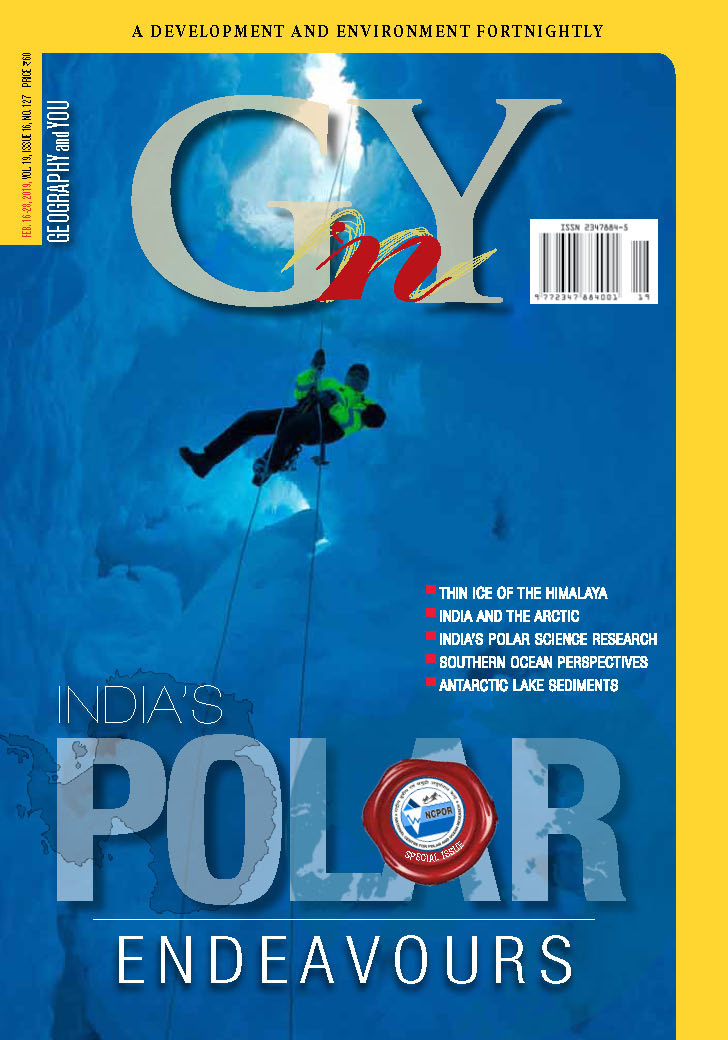
Inside this issue
India’s Polar Endeavours
India’s visibility in the exploration of polar frontiers has progressed appreciably over time. India is now widely viewed as an emergent power, warranting multi-disciplinary international collaborations. Such interventions will help India establish a niche domain in global scientific affairs.
The Southern Ocean plays a major role in the global carbon sequestration and cycling, strongly influencing the global climate pattern. Since 2004, ten successful scientific expeditions to the Indian sector of Southern Ocean have been carried out to understand its complexities and role in carbon sequestration, biodiversity and other Earth system processes.
The stability of floating Antarctic ice shelves is key to the understanding of Antarctic’s contribution to the global sea-level rise. An Indo-Norwegian project, MADICE was initiated to study the role of ice shelves and ice rises in stabilising ice sheets around the coastal Dronning Maud Land of East Antarctica.
The sea-level change reconstructed for the last three million years shows that the sea-level has been higher by 5 m than the present when global temperatures were warmer by 2oC than that which existed during the pre-industrial level.
Himalayan glaciers influence the water regimes of major river systems in Asia and help sustain more than a billion people from several countries. Changing climate is threatening the health of Himalayan glaciers and potentially increasing hazards like glacier lake outburst flood, avalanches and landslides.
The Arctic holds special importance for India as the Indian monsoon and Arctic processes are intricately connected. The First Indian scientific expedition to the Arctic was launched in 2007 which led to establishment of ‘Himadri’ in Ny-Ålesund in 2008. India joined the International Arctic Science Committee in 2012 and is an Observer in the Arctic Council since 2013.
India is making major advances in polar research. At the same time, it is also inspiring the younger generation to work in this sector. Polar outreach activities are aimed to connect teachers, students and citizens and help enthusiastic scientists, educators and communicators take an active interest in Polar research.
IN CONVERSATION WITH
In conversation with M N Rajeevan, a leading atmospheric scientist and Secretary, Ministry of Earth Sciences (MoES), Government of India.
G’nY. NCPOR has changed its name several times to justify its reorientation to changing roles. How would you define these rechristening? The first Indian expedition to Antarctica was launched from National Institute of Oceanography (NIO), Goa. Soon after the Department of Ocean Development (DOD) came into existence. With an increasing awareness of Antarctica, DOD soon.
In brief
Global cooperation for earth’s cryosphere The world is a strange place. We take our bright tropical sunlight and tall green trees for granted. Imagine living in a cold, barren and dark place, veiled in blinding mists and devoid of even a single blade of grass—let alone trees. I remember talking
The cherished moments of success in the history of NCPOR With its domain and mandate spread over the three Polar regions—Arctic, Antarctic and Himalaya and the oceans around, National Centre for Polar and Ocean Research (NCPOR) has grown into a formidable and prominent Polar institute in the worl
